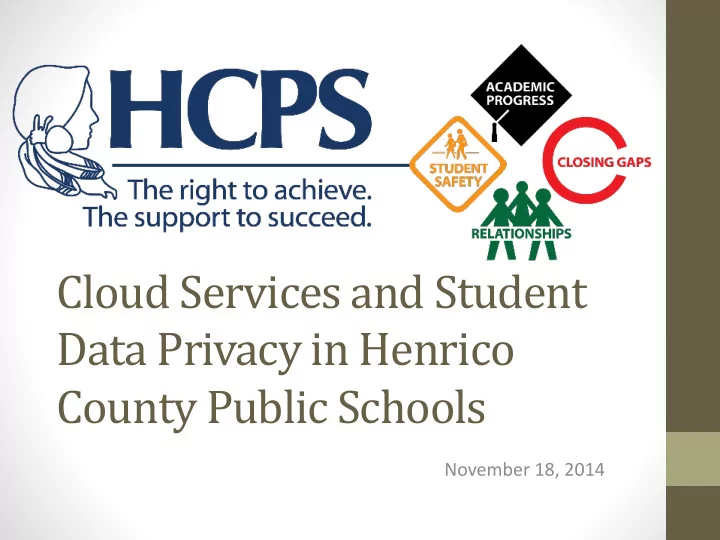

Cloud Services and Student Data Privacy in Henrico County Public Schools November 18, 2014
Agenda • District Overview • Cloud Services • Content Filtering • Digital Citizenship • Student Information System
Henrico County Public Schools • 49,894 Students • 6,672 Staff • 75 Facilities • High speed internet access at all locations • Wireless network access at all locations • 1:1 Computing Initiative • World’s first K -12 1:1, started in 2001 • All secondary students (25,000) • Elementary students have access to classroom and cart based computers and tablets
Cloud Services • Cloud Computing • New approach to traditional networked computer services • Web Technology • Platform agnostic • HCPS has been using cloud services for over 14 years • Public vs. Private Cloud vs. Hybrid • HCPS uses all approaches • Public – Google • Private – SchoolSpace Learning Management System • Hybrid – Staff email using Microsoft Exchange and Office 365, Pearson Test Nav
Cloud Services • Services used by Teachers • Google Docs • Office 365 • Talent Ed • Services Used by Student • Google Apps for Education • Gmail (Secondary students) • Content services (YouTube for Education, Learning, Discovery, Study Island, Brain Pop) • Assessment tools (IA, Pearson Test Nav, NWEA)
Cloud Services • Terms of Service • Many cloud services restrict usage to certain age groups (ex. 13+) • HCPS works with cloud vendors to ensure terms of service for age and data usage are aligned with policy and for student use • Reliance on free services limits HCPS control • Providing professional development to teachers regarding terms of service • Personally Identifiable Information • Definition: Information that can be used on its own or with other information to identify, contact, or locate a single person, or to identify an individual in context. • HCPS limits content shared with vendors on a need to know basis • Clear data usage protocols documented in policies and contract language
Content Filtering • Requirement to Qualify for e-Rate Funding • Children’s Internet Protection Act • Child Online Protection Act • YouTube for Education • Educational content • Instructionally relevant and vetted • Exception Process • Instructionally relevant content • Reviewed by HCPS content specialists
Digital Citizenship • Appropriate behavior instead of tight control • Technology will never provide a perfect solution • Emphasize classroom management and engagement • Internet Safety Training • Teachers, Students and Parents • Additional training for rising 6 th graders and parents • Social Media usage • Acceptable Use Policy • Outlines appropriate and inappropriate technology usage • Applies to students and staff • Signed by students and parents • Information Security • Network and system controls to limit unauthorized access • Strong passwords for all users
Student Information System • Pearson PowerSchool • Web based and public facing • Demographic information • Grades • Locally hosted • All PowerSchool servers hosted at the HCPS datacenter • Limited system integration with other services • Data shared with other services is pre-defined by HCPS • Aligned with privacy policies • User Identity Management • Active Directory (AD) repository of user information • PowerSchool and other systems use AD for authentication and authorization services • AD servers hosted at the HCPS datacenter
Questions?
Recommend
More recommend